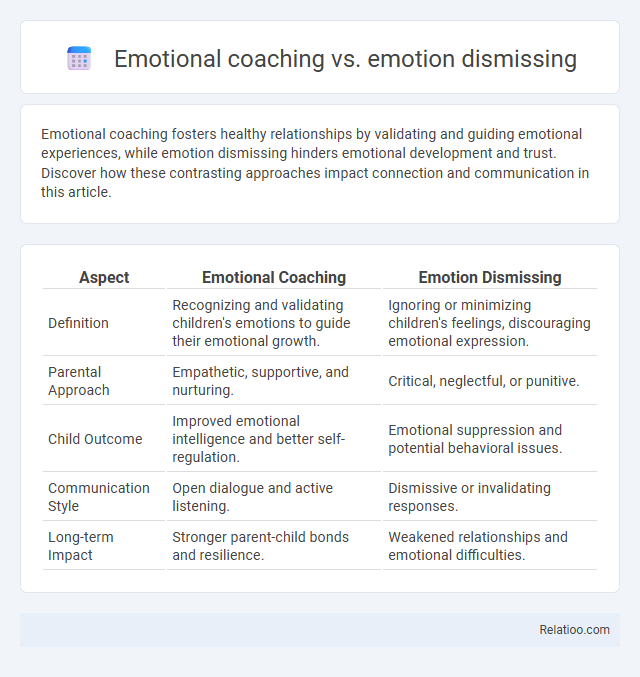Emotional coaching fosters healthy relationships by validating and guiding emotional experiences, while emotion dismissing hinders emotional development and trust. Discover how these contrasting approaches impact connection and communication in this article.
Table of Comparison
| Aspect | Emotional Coaching | Emotion Dismissing |
|---|---|---|
| Definition | Recognizing and validating children's emotions to guide their emotional growth. | Ignoring or minimizing children's feelings, discouraging emotional expression. |
| Parental Approach | Empathetic, supportive, and nurturing. | Critical, neglectful, or punitive. |
| Child Outcome | Improved emotional intelligence and better self-regulation. | Emotional suppression and potential behavioral issues. |
| Communication Style | Open dialogue and active listening. | Dismissive or invalidating responses. |
| Long-term Impact | Stronger parent-child bonds and resilience. | Weakened relationships and emotional difficulties. |
Understanding Emotional Coaching and Emotion Dismissing
Emotional coaching involves recognizing, validating, and guiding children through their emotions, fostering emotional intelligence and resilience. Emotion dismissing, in contrast, minimizes or ignores emotional experiences, often leading to suppressed feelings and difficulty in emotional regulation. Understanding emotional coaching emphasizes active listening and empathy, which promotes healthy emotional development and stronger parent-child relationships.
Key Differences Between Emotional Coaching and Emotion Dismissing
Emotional coaching involves recognizing and validating your child's feelings, guiding them to understand and manage emotions effectively, fostering emotional intelligence and resilience. Emotion dismissing minimizes or ignores emotional experiences, telling children their feelings are wrong or unimportant, which can lead to difficulties in emotional regulation and lower self-esteem. The key difference lies in emotional coaching's supportive, educational approach versus emotion dismissing's neglectful or critical stance, profoundly impacting your child's long-term emotional development.
The Impact of Emotional Coaching on Child Development
Emotional coaching significantly enhances child development by fostering emotional intelligence, self-regulation, and secure attachment, which contribute to better social skills and academic performance. In contrast, emotion dismissing undermines a child's ability to understand and manage feelings, often leading to increased anxiety, behavioral problems, and poor emotional regulation. Research shows that children who experience consistent emotional coaching exhibit higher resilience and improved mental health outcomes compared to those subjected to dismissive or neglectful responses.
Negative Consequences of Emotion Dismissing
Emotion dismissing involves ignoring or minimizing a child's feelings, which can lead to emotional suppression and hinder healthy emotional development. This approach often results in increased anxiety, low self-esteem, and difficulty in forming trusting relationships later in life. In contrast, emotional coaching validates emotions, teaching children to understand and regulate their feelings effectively, promoting resilience and well-being.
Signs of an Emotionally Coaching Parent
Emotionally coaching parents recognize and validate their child's feelings, responding with empathy and guidance to help them understand and manage emotions effectively. Signs of an emotionally coaching parent include active listening, acknowledging emotions without judgment, and offering support to develop emotional intelligence. Your consistent emotional coaching fosters resilience and healthy emotional development, contrasting sharply with emotion dismissing or neglectful approaches that can hinder a child's emotional growth.
Common Behaviors of Emotion Dismissing Caregivers
Common behaviors of emotion dismissing caregivers include minimizing or ignoring a child's feelings, telling them to "calm down" or "stop crying," and discouraging emotional expression. These actions can lead to a lack of emotional awareness and difficulty regulating feelings in children. Your approach as an emotional coach encourages validation and understanding, fostering healthy emotional development.
Emotional Regulation Skills Fostered by Coaching
Emotional coaching enhances your emotional regulation skills by teaching you to recognize, understand, and manage your feelings effectively, fostering resilience and empathy. In contrast, emotion dismissing ignores or minimizes emotions, which hinders emotional awareness and regulation, often leading to increased stress and poor coping mechanisms. Emotion coaching cultivates balanced emotional responses by validating emotions and providing strategies to navigate them constructively, promoting long-term mental well-being.
Long-Term Effects on Emotional Intelligence
Emotional coaching fosters higher emotional intelligence by teaching You to recognize, understand, and manage emotions effectively, promoting healthier relationships and resilience. Emotion dismissing, conversely, suppresses emotional expression, often leading to poor emotional regulation and reduced empathy over time. Emotional coaching consistently encourages reflective dialogue and emotional validation, creating lasting improvements in self-awareness and emotional competence.
Practical Strategies for Practicing Emotional Coaching
Emotional coaching involves recognizing and validating Your emotions, guiding you to understand and manage feelings effectively through empathy and active listening. In contrast, emotion dismissing neglects or minimizes emotional experiences, often leading to unresolved feelings and poor emotional regulation. Practical strategies for emotional coaching include labeling emotions accurately, encouraging expression without judgment, and modeling healthy coping mechanisms to foster emotional intelligence.
Transitioning from Emotion Dismissing to Emotional Coaching
Transitioning from emotion dismissing to emotional coaching involves recognizing and validating your child's feelings instead of ignoring or minimizing them. Emotional coaching helps build stronger relationships and improves emotional intelligence by guiding Your child through understanding and managing their emotions effectively. This shift enhances communication skills and fosters resilience, making emotional coaching a vital approach to nurturing emotional well-being.

Infographic: Emotional coaching vs Emotion dismissing
 relatioo.com
relatioo.com